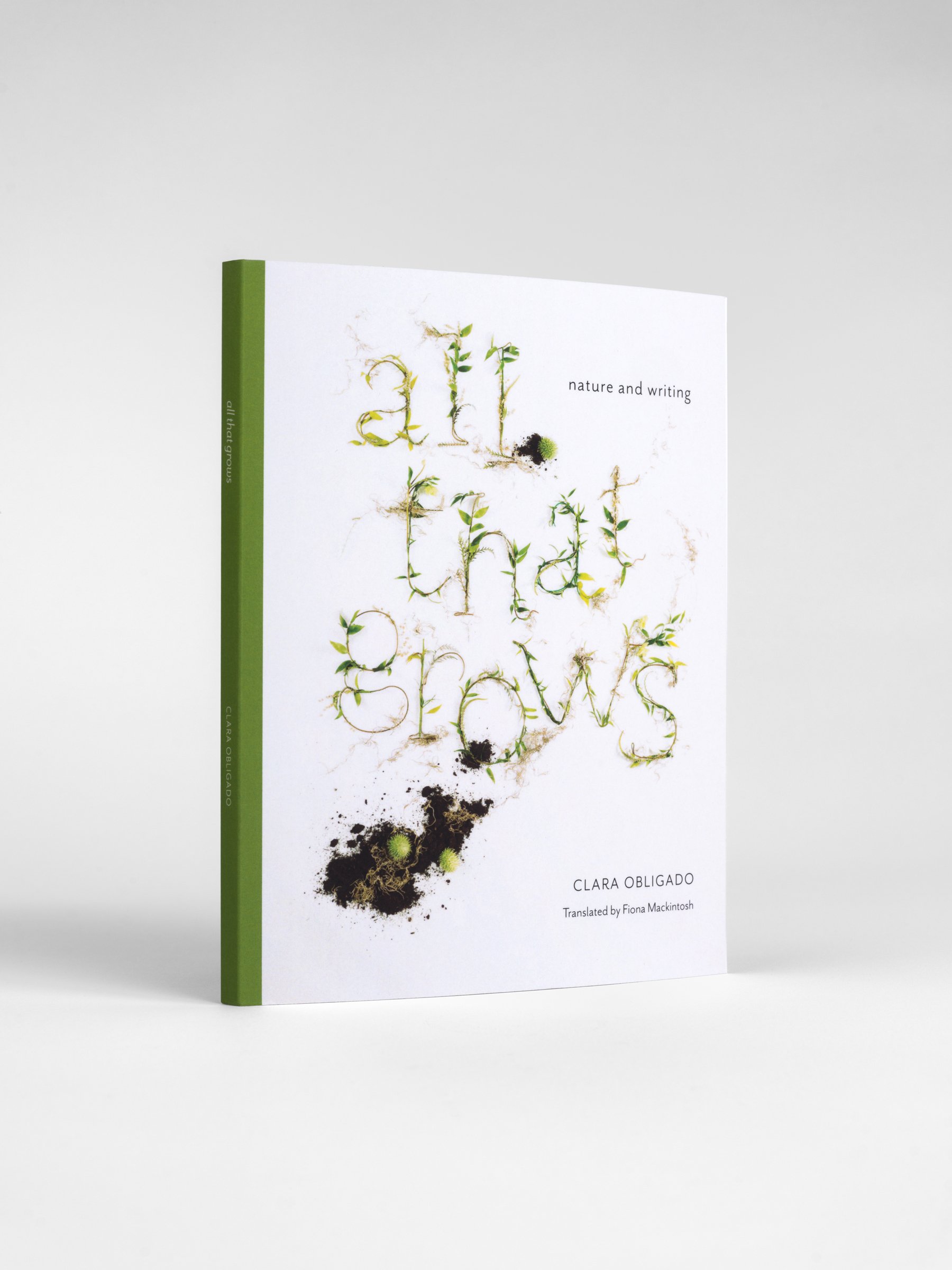all that grows: nature and writing
all that grows: nature and writing
Author: Clara Obligado
Translation: Fiona Mackintosh
Editors: Gwen Davis-Barrios, Alexandra Grant, Nicole Hervás Ibañez
Foreword: Nicole Hervás Ibañez
Introduction: Erica Durante
Interview: Erica Durante
Design: Dana Collins
Cover Art: Julieta Obligado and Alejandro Fernández Banegas
Published in 2025
7 x 5.5 x .5 inches (17.8 x 14 x 1.3 cm), 128 pages, paperback
ISBN: 9798990698512
A reminder for our European customers that you can order in Europe from Les Presses du Réel here.
all that grows: nature and writing is the English-language translation of Todo lo que crece: naturaleza y escritura by the Argentinian author Clara Obligado. The book chronicles the author's upbringing in Argentina, her exile to Spain, and her resulting reconciliation of place, memory, loss, and growth. Through botanical and natural metaphors as well as frank recollection of events, the book explores the passage of time across different hemispheres and dialects. As the author navigates shifts in landscape and language, her writing becomes a shelter and a form of time travel, mirroring the natural world’s ability to invent and reinvent itself.
Clara Obligado was born in Buenos Aires and has lived in Madrid since 1976, where she writes and teaches creative writing workshops. Her awards include the Lumen Prize for her novel La hija de Marx [Marx’s Daughter] (1996), the Juan March Cencillo Short Novel Prize for Petrarca para viajeros [Petrarch for Travelers] (2015), and the Setenil Award for El libro de los viajes equivocados [The Book of Mistaken Journeys] (2011). Her essays Una casa lejos de casa: La escritura extranjera [A Home Far from Home: Foreign Writing] (2020) and Todo lo que crece: naturaleza y escritura [all that grows: nature and writing] (2021) have been republished multiple times. As an anthologist, she has ventured into microfiction with Por favor, sea breve [Please, Be Brief] (2009), and she coordinated the Atlas de Literatura Latinoamericana (arquitectura inestable) [Atlas of Latin American Literature (Unstable Architecture)] (2022). Her latest book is Tres maneras de decir adiós [Three Ways to Say Goodbye], published in March 2024. Obligado’s work has been translated into several languages. She has never lost contact with her country of origin, where her work is published by various publishing houses.
Fiona Mackintosh is a Senior Lecturer in Latin American Literature at the University of Edinburgh, Scotland. She researches 20th and 21st century Latin American literature, especially women’s writing from Argentina, poetry, and translation. She has published extensively on Silvina Ocampo, Alejandra Pizarnik, and Claudia Piñeiro, and her translations include Luisa Valenzuela’s short story “The Other Book” in BOMB Magazine, Claudia Piñeiro’s short story “Dad’s Place” in la piccioletta barca and the co-translation with Iona Macintyre of Gabriela Cabezón Cámara’s The Adventures of China Iron (Charco Press), which was short-listed for the International Booker Prize.
Nicole Hervás Ibañez is based in Berlin, where she lives and works. Originally from Argentina, she has self-published two poetry collections: II Haikus (2018) and Bura (2022). She is an editor at X Artists’ Books and the co-founder of Acacia Books, a small independent publisher dedicated to crafting artisan books.
Erica Durante is an Associate Professor of Hispanic Studies at Brown University and holds a Ph.D. in Comparative Literature from Sorbonne Nouvelle – Paris III. Her research focuses on 20th and 21st-century Latin American literature, with a particular emphasis on the works of contemporary women writers from across the region. A prolific scholar, she has authored several books and numerous scholarly articles, making significant contributions to the field. Beyond academia, Erica is passionately dedicated to bridging scholarship and public engagement. She leads innovative public humanities initiatives and collaborates on community-based projects, amplifying the reach and impact of literature to foster meaningful societal dialogue.
Dana Collins grew up in a touring and signed punk/hardcore/thrash/whatever-you-want-to-call-it kind of band. Before he ever heard the term "graphic design," he was making and xeroxing flyers, doing paste-up mechanicals for record covers, pulling silkscreen posters and t-shirts in his mom's garage, making punk pins, inking logos, spray painting things he was not supposed to spray paint, etc., doing what he could to get the band name in front of as many punker eyeballs as possible. Little did he know, this unorthodox upbringing and DIY ethos would serve as proper soil for a graphic design career. He is the father of four and grandfather of two and lives somewhere in that grid-thing known as Los Angeles.
Julieta Obligado is a graphic designer specializing in visual identity and editorial design. She studied fine arts and graphic design at the Escuela Superior de Diseño de Madrid (ESDM), where she has also taught. She completed a master's degree in Publishing at the Universidad Autónoma de Madrid (UAM). Throughout her career, she has worked on projects for academic institutions, research centers, festivals, and cultural events, within Spain and internationally. Alongside her professional design work, she currently teaches at the Escuela de Arte Alberto Corazón in Alcalá de Henares.
Alejandro F. Banegas uses nature- and art-inspired design to create a relationship with the plant world. Trained in fine arts and interior design, his professional work creatively incorporates both fields through window dressing, styling, and set design. As a floral designer, he has worked with leading Spanish florists as well as various brands. The “floral creativity” of Taller Banegas [Studio Banegas] encompasses his work from commercial formats and interior design to more artistic approaches. His work is centered on spatial interactions and on translating material values into natural elements.
all that grows: nature and writing was originally published in Spanish by Páginas de Espuma in Spain in 2021.
This publication is part of X Artists’ Books’ X Topics (XT) series, a collection of books focused on the writing and ideas of marginalized voices.





